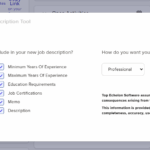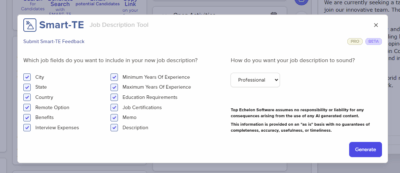In the world of recruiting, few things are more frustrating than the sudden silence from a client after you’ve worked hard to line up promising candidates. If you’ve ever experienced this—whether waiting for feedback after an interview or for a decision to be made—then you know how it can disrupt the entire recruitment process. Situations such as these in client relationships, often referred to as the “disappearing client syndrome,” can waste valuable time and leave both candidates and recruiters in a bind.

So, what’s the solution? According to Barb Bruno, CPC/CTS of Good as Gold Training, an industry-leading recruitment trainer, it all comes down to effective communication and rapport-building. “When your client understands the WIIFM—What’s In It For Me—they’re far more likely to stay engaged and communicate,” says Bruno. It’s about making the client feel like you’re working to make them shine, not just filling a job opening.
In this article, we’ll explore five actionable strategies to build stronger rapport with your clients and ensure that communication stays consistent and productive. By doing so, you’ll not only improve client engagement but also increase your placement success rates and foster long-term relationships built on trust.
1. Build a Personal Connection
One of the first steps in developing a strong client relationship is to make it more personal. While it’s important to maintain professionalism, establishing a personal connection can go a long way in building trust. “Aim to learn at least one personal detail about your client during every third interaction,” suggests Bruno. This could be as simple as learning about their family, hobbies, or professional aspirations.
Knowing personal details creates an opportunity for genuine conversations, which are far more engaging than a continuous exchange of work-related emails and calls. These personal touchpoints can be woven naturally into your interactions, making the client feel valued as an individual, not just a transaction.
For example, if you know your client enjoys golfing, you can casually ask how their game has been before diving into the business at hand. These small gestures create a positive association with you and your service, making your communication more memorable.
2. Engage with Positivity and Attentiveness
Maintaining a consistently positive and helpful attitude is essential in fostering client rapport. Clients want to feel that they are being prioritized and that their needs are being taken seriously. An attentive approach shows that you’re not just going through the motions but that you’re actively invested in their success.
Bruno emphasizes, “Clients will always remember how you made them feel, even more than what you said.” This means that your tone and attitude during every interaction matter just as much as the content of your conversations.
Stay proactive in offering help, even when the client hasn’t explicitly asked for it. For example, you might reach out with suggestions for optimizing their hiring process or share industry news that could impact their recruitment efforts. When clients feel that you are genuinely looking out for their best interests, they’re far more likely to stay engaged with you throughout the recruitment process.
3. Provide Regular Updates
Clients don’t like to feel left in the dark, especially when it comes to the critical task of filling an important position. One of the most effective ways to prevent the “disappearing act” from happening is to keep your clients informed every step of the way. Providing weekly status reports—whether through a phone call or an email—ensures that your client knows the progress you’re making and gives them opportunities to provide feedback or request adjustments.
Bruno recommends sending updates on Fridays to recap the week’s progress and preview what’s coming next. This habit helps the client feel confident that things are moving forward and gives them peace of mind over the weekend.
By regularly sharing the status of candidate sourcing, interviews, and feedback, you not only maintain momentum in the hiring process but also keep your client accountable for staying involved. This strategy also allows you to catch any issues or concerns early on before they escalate.
4. Be the Best Listener in Their Professional Life
One of the most underrated yet powerful tools for building client rapport is active listening. Too often, recruiters are focused on pushing their agenda or selling their service without fully understanding their clients’ needs. “Strive to be the best listener your client has in their professional life,” Bruno advises.
Listening actively means more than just hearing the words being said. It involves paying attention to the underlying concerns, goals, and even anxieties your client may have about the hiring process. When you make a conscious effort to understand your client’s perspective fully, you can position yourself as a trusted advisor, not just a service provider.
This also allows you to tailor your solutions to better fit their specific needs, which strengthens their trust in you. Clients will see you as someone who “gets them,” and they’ll be more likely to turn to you for advice and updates, rather than withdrawing or going silent.
5. Highlight the WIIFM at Key Stages
People are always most interested in how something benefits them. By consistently highlighting the What’s In It For Me (WIIFM) factor throughout the recruitment process, you can keep your clients engaged and remind them of the value you bring.
For example, when presenting candidates, emphasize not only the candidate’s qualifications but also how hiring that candidate will solve specific problems the client is facing. Rather than focusing solely on filling the vacancy, you should reinforce how hiring this person will benefit the client’s overall business goals.
Bruno puts it succinctly: “You need to make it crystal clear how your work benefits your client at every step of the process.” By doing so, you remind them of the value you bring, making them more likely to stay engaged and communicative throughout the hiring process.
Elevating Your Client Relationships
Building rapport is just the first step. The real goal is to elevate your client relationship from being viewed as a vendor to becoming a trusted advisor, consultant, and, eventually, a friend. This requires transparency, reliability, and a genuine commitment to the client’s success.
Here are some additional ways to strengthen your client relationships and prevent communication breakdowns:
- Share market insights: Providing insights about the job market, competitor hiring trends, or industry benchmarks can position you as a thought leader. Clients appreciate when you go beyond just finding candidates and offer them valuable information they can use to make informed decisions.
- Provide regular updates on top talent: Let your clients know about standout candidates in the market, even if there’s no immediate job opening. This keeps them aware of talent availability and demonstrates your proactive approach.
- Offer tailored training sessions: If your client struggles with certain aspects of hiring, offer to provide training or workshops that address their needs. Whether it’s improving interview techniques or streamlining the onboarding process, you can add value beyond candidate placement.
- Foster open communication: Share your personal contact information and make it easy for clients to reach you when needed. Encouraging open lines of communication will help build trust and keep them engaged.
- Seek feedback regularly: Client surveys or informal feedback sessions can help you gauge how well you’re meeting their expectations. When clients see that you’re committed to improving your service, they’re more likely to stay loyal and provide open communication.
Preventing the Disappearing Act
One of the biggest frustrations for recruiters is when a client goes silent. To prevent this from happening, proactive communication is key. Here are some strategies to ensure your clients don’t disappear when you need them most:
- Secure interview commitments upfront: When scheduling interviews, obtain firm commitments from your client, and ask for a secondary contact if they become unavailable. This ensures that the process moves forward even if your main contact is temporarily unreachable.
- Educate clients on the importance of timely communication: Explain how providing post-interview feedback quickly can give them a competitive advantage in securing top talent. When clients understand the consequences of delays, they’re more likely to stay engaged.
- Gauge interest levels using a numerical scale: Ask your client to rate their interest in a candidate on a scale from 1 to 10 after interviews. This provides clarity on their level of commitment and helps you determine how to follow up.
- Maintain a pool of qualified candidates: Sometimes, delays happen due to a lack of urgency from the client’s side. By keeping a pool of qualified candidates ready to go, you can minimize delays in the hiring process and maintain momentum.
Long-Term Client Relationships: Building Trust and Collaboration
At the heart of preventing the disappearing client syndrome is the concept of trust. When clients trust that you’re not only capable but also genuinely invested in their success, they’ll be more likely to maintain open lines of communication. Trust is built through consistent, proactive actions and delivering on promises.
Barb Bruno emphasizes, “Your goal should be to move from vendor to trusted advisor. When you become the person they turn to for advice and consultation, you’ve succeeded.” By cultivating long-term, collaborative client relationships, you position yourself as a key player in their hiring strategy—not just someone they call when they need a position filled.
By adopting these strategies, you can mitigate the issue of disappearing clients and cultivate long-term, mutually beneficial relationships based on trust and collaboration. Remember that every interaction is an opportunity to reinforce your value, build rapport, and solidify your role as an indispensable partner in your client’s success.
Client Relationships: The Final Word
Recruiting is a relationship-driven business, and your success depends on how well you maintain those relationships. By focusing on building strong rapport, engaging your clients with positivity and attentiveness, and consistently highlighting the WIIFM, you can keep your clients engaged and avoid the frustrating “disappearing act.”
As Barb Bruno wisely states, “Your clients are your greatest asset. Treat them well, communicate clearly, and always provide value—and they’ll stay with you for the long haul.” By adopting these principles and strategies, you’ll not only improve client communication but also increase your success as a trusted advisor in the recruiting industry.








